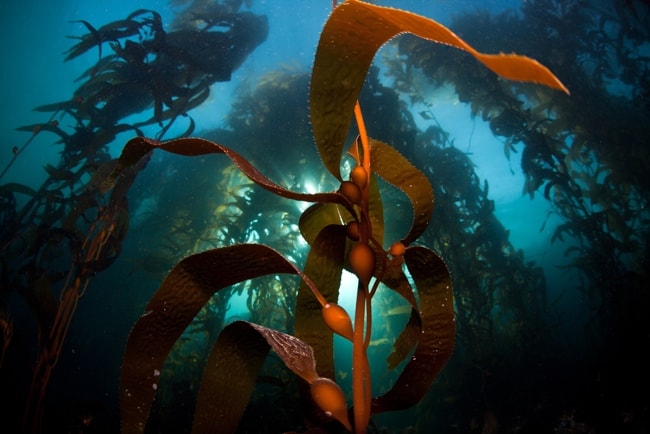Sea Moss and Sea Vegetable Superfoods
Amazing Algae and Super Sea Plants
The ocean is the cradle of life on Earth. It’s one of our planet’s most biologically dense ecosystems – tens of billions of lifeforms are contained in the oceans and seas. From the tiniest microplankton to the largest blue whale, the ocean has provided each of them with food and nourishment. Almost every naturally-occurring vitamin, mineral, and element is found in seawater. This is what makes sea moss and algae so nutritionally dense. They sit submerged below the surface, absorbing what they need from the surrounding water.
Unlike terrestrial plants, they are not limited by the resources available in the patch of soil beneath them. The shifting currents ensure constant deliveries of essential nutrients. This enables them to grow rapidly and reach massive sizes faster than their land-bound counterparts ever could.

Incorporating sea moss and other sea vegetables into your diet is a great way to increase your intake of vitamins, minerals, and essential organic compounds. Many cuisines, such as Japanese, already make use of seaweed and algae. However, it has not caught on as much elsewhere. That’s unfortunate because these delicious plants are packed full of everything a human body needs to thrive. (Notably, the top 3 countries in the world for life expectancy feature seaweed prominently in their diet).
While eating sea plants is one way to take advantage of their exceptional nutritional profile, sea vegetable supplements are a great way to receive their benefits. Here are the top oceanic superfoods to look out for.
Irish Sea Moss
Sea moss isn’t really moss. It’s in a different family than its terrestrial cousin, but like regular moss, it’s a spongy plant that grows over the sea floor. For years, sea moss has been used as a source of the thickening agent carrageenan for commercial foods. However, it has recently come into its own as a superfood. Sea moss is rich in minerals such as calcium, magnesium, iron, and potassium, as well as A, E, and C vitamins. It’s also a great source of thyroid-regulating iodine (which our bodies cannot produce naturally) and prebiotic fiber. Other potentially beneficial compounds in sea moss are still being studied with promising results.
Spirulina
Spirulina is a blue-green algae that has picked up a lot of traction in recent years. There’s a good reason for it – spirulina is one of the most nutritionally complete foods on Earth. Ancient Aztecs cultivated the algae as a food source, and it is said that Aztec messengers consumed spirulina for sustenance on their marathon-length delivery runs. Spirulina is extremely high in iron, copper, magnesium, and B vitamins 1 through 6. One tablespoon of spirulina has more than twice the amount of potassium of a banana. It is also an excellent source of protein with 5 grams per 20 calories, comparable to eggs. Research has also suggested that taking spirulina may help the body produce more “natural killer” cells, boosting immune response.
Kelp
Kelp grows in massive forests beneath the waves, providing a haven for all manner of marine life. It is used in culinary applications; kelp pickles are an increasingly popular choice, and dried kelp is a common ingredient in East Asian cuisine. It grows even faster than bamboo, which makes it a very promising sustainable food. However, it is as nutritious as it is yummy. Kelp is very high in Omega-3 fatty acids, which are crucial for heart and brain health.
Likewise, it is plentiful in vitamins A, E, and K, as well as B vitamins niacin, riboflavin, and thiamine. Kelp also contains many micronutrients and trace minerals which are beneficial to humans, such as vanadium, calcium, magnesium, iron, and phosphorus. Additionally, kelp is higher in prebiotic dietary fiber than most vegetables. Taking kelp supplements is a great way to obtain nutrients not commonly found in terrestrial foods.
Chlorella
Chlorella is another blue-green algae related to Spirulina. It has a similar nutritional profile, being high in protein, vitamins, and minerals. However, it provides another important health benefit. Taking chlorella supplements has been shown to help rid the body of heavy metals, as the algae binds with the toxins and flushes them from your system. This can be a boon for people with concerns about heavy metal buildup. Folks with older dental fillings, those who work around metal, or who may have been exposed to environmental contaminants may want to consider chlorella supplements.
The sea can provide us with nutritional richness seldom found on land, contributing to a complete and balanced diet. Stop in to find out more about what sea moss, kelp, spirulina, and chlorella can do for you.
These statements have not been evaluated by the FDA. They are not intended to treat, diagnose, cure or prevent any disease.
